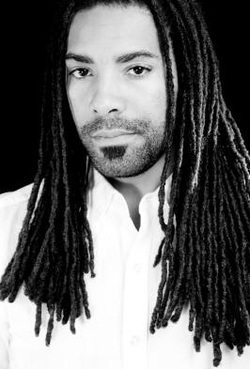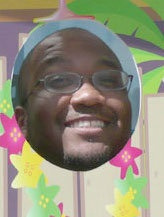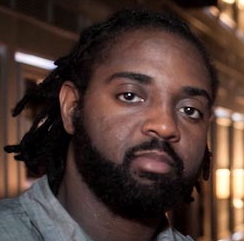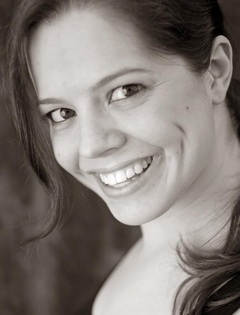 I first met L. Lamar Wilson a few years back, and he quickly won my affection. Among the first qualities I noticed was Wilson's admirable humility – at that point, he was returning to poetry after years spent as a journalist, so he had a rare combination of experience as a writer, but also a gratitude to be doing this particular work that many of us easily lose sight of. Wilson is a spiritual man, and a passionate one: he's often soft-spoken, painstaking in his speech, but has the kind of laugh that sets him and anyone nearby alight. Wilson's poems clearly reflects his character. I love Wilson's sincerity, his flexibility with narrative and lyric alike, his faith, and the resonance of his desire. One of my favorite aspects of his writing is Wilson's capacity to help me feel: these are poems born of a love that runs very deep indeed - and a love, I suspect, that greatly benefits all his readers. The poem below was first published in Cream City Review, and also in Wilson's first book, Sacrelegion, published last year on Carolina Wren Press. The photograph was taken by Rachel Eliza Griffiths. * Ratiocination Outside looking in, I cannot place you, though your breath tickles the hairs in my nose each night. They will not go away no matter how often or how closely I clip them, & you will not let me penetrate you no matter how many times you let me penetrate you. You smile in your sleep more than you smile when you are awake, & I like to watch you from this distance. This must be how mercury feels deep inside the heart of this red & brown clay beneath us: deadly when we taste its ruddy gray, slick- hot as that planet closest to the sun, hidden from Earthly view by that star that burns all flesh it touches & eludes us all. You are soil, like me. Roiled & sullen, like me. Together, we cannot bear fruit. O lover, in this full moon light, teach me how to hide inside the embrace of three-quarter you, half-you, quarter- you, full of me. * Sacrilegion, L. Lamar Wilson's first book, is the 2012 winner of the Carolina Wren Press Poetry Series. Wilson has earned fellowships from the Cave Canem Foundation, the Callaloo Workshops, the Alfred E. Knobler Scholarship Fund, and the Arts and Sciences Foundation at the University of North Carolina at Chapel Hill, where he is completing a doctorate in African American and multiethnic American poetics. We're excited to announce our nominations for the annual Best of the Net Anthology from Sundress Publications.
"Taking It" by Vievee Francis "Elegy with a Blue Wing" by Brynn Saito "untitled" by Rachel McKibbens "Passing" by Cynthia Manick "Sunday Morning: Ars Poetica" by Christina Olivares "The Snail Scene" by Scott Beal  Tarfia is one of my favorite poets on this list. I've had the good fortune to meet this incredible woman twice, once at a feature I did in Berkeley, and once at a reading we did together. So I can assure you she's human and whatever, but I initially assumed robotics came into play when such an unfathomable heart and such talent on the page worked in concert. Why is she so good? She's obviously very well-read, and she uses that reading to further her work. Of the batch of poems she sent me, one referenced Valléjo, another Tranströmer – two very different but important poets – and she did both of them justice, without losing touch with her own style. And Faizullah has elegant style. She knows line, pacing, and imagery. She understands beauty in the best way: as a means of perceiving the world as something much more grand than our tiny concerns. I'm so glad to share a little bit of her work with all of you. Her first book is coming out next year. You should read it and discover the gorgeous patterns she makes. The poem below was previously published in The Missouri Review. * Tarfia Faizullah is the author of Seam (Southern Illinois University Press, 2014), winner of the 2012 Crab Orchard Series in Poetry First Book Award. Her poems appear in Ploughshares, The Missouri Review, The Southern Review, Massachusetts Review, Ninth Letter, New England Review, Washington Square, and elsewhere. A Kundiman fellow, she received her MFA from Virginia Commonwealth University and is the recipient of an AWP Intro Journals Project Award, a Ploughshares Cohen Award, a Fulbright Fellowship, a Copper Nickel Poetry Prize, a Dorothy Sargent Rosenberg Prize, scholarships from Bread Loaf Writers’ Conference and Sewanee Writers’ Conference, fellowships from the Kenyon Review Writers’ Workshop and Vermont Studio Center, and other honors.  Sandra Beasley is another new poet for me. I mentioned to a colleague I was looking for new names for this project, and Beasley was among the folks he recommended whose work moved me right away. That wasn't the case for every suggestion; it's easy to forget how subjective poetry can be. Those of us who are ride-or-die Elizabeth Bishop fans may have vastly different opinions about Jean Toomer, for example. I think this is a beautiful thing, overall – but when we're dealing with living poets, people with whom we may be actively associated, the argument stops being abstract, and can start being very personal. I hope I'll never stop soliciting recommendations, but they can make me a little nervous. My colleague and I do agree in this case, though, and I'm grateful Beasley is finally on my radar. This poem in particular moves me because it's so ornate. The poet is musically deft: her manipulation of assonance, consonance, rhyme and meter are staggering. It's not often that a poet can be sonically baroque in a way that lends pleasure without distracting from the narrative, but Beasley refuses to compromise either lyric or story. This is a poem that begs to be read aloud, and read again and again to savor every little joke, jab, and revelation. Sandra Beasley had me at this valentine, and I hope you feel the same way. The poem below was previously published in Tin House. * The Sword Swallower’s Valentine You had me at that martini. I saw you thread the olive’s red pimento throat with your plastic swizzle stick, a deft act at once delicate and greedy. A man paid to taste the blade knows his match. The pleasure. The brine. I wish we had time, I said—you stopped me--There’s always time. That’s when they called me to the stage. I saw your mouth’s angle change as you made a match of my name and Noted Gullet! Steel Throat! Ramo Swami, the Sword-Swallowing Man. I want to assure you it’s just an act, but since age seven it’s the only act I know. My mother recalls that first time she caught my butter-knife trick: a real man might not cry, but the real boy wept. She saw my resolve to build a tunnel from throat to feet. A dark that deep could go unmatched, she warned. Your smile is the strike of a match, the hope of an inner spelunking act. Facing the crowd, the sight of your pale throat tightens mine at the worst possible time-- that fickle tic of desire. Yeah, I saw his last show, you’ll say. Lost focus, poor man. Funny how women make and break their men, how martinis both break and make a match. The best magician will hang up his saw, release his doves, if the right woman acts to un-straightjacket his body in time. If lips meet, the hint of gin in your throat will mingle with camellia in my throat, same oil used by any samurai man. I trained against touch once upon a time, not knowing a rigid pharynx would match a rigid heart. I’m ready to react, to bleed. As any alchemist can see, to fill a throat with raw steel is no match for love. Don’t clap for these inhuman acts. Cut me in two. Time, time: the oldest saw. * Sandra Beasley won the Barnard Women Poets Prize for I Was the Jukebox, selected by Joy Harjo. Her first collection, Theories of Falling, won the New Issues Poetry Prize judged by Marie Howe. Her poetry has appeared in Poetry, AGNI, Tin House, and Virginia Quarterly Review and was chosen for The Best American Poetry 2010. Beasley served as the 2013 Writer in Residence at Lenoir-Rhyne University in Hickory, N.C. Other honors include the 2013 Center for Book Arts Chapbook Prize, a University of Mississippi Summer Poet in Residence position, a DCCAH Individual Artist Fellowship, the Friends of Literature Prize from the Poetry Foundation, and the Maureen Egen Exchange Award from Poets & Writers. She has received fellowships to the Sewanee Writers’ Conference, the Millay Colony, VCCA, and Vermont Studio Center. Her nonfiction has been featured in The New York Times, Washington Post Magazine, and The Oxford American. In 2011 Crown published Don’t Kill the Birthday Girl: Tales From an Allergic Life, her memoir and a cultural history of food allergies. She lives in Washington, D.C.  I know Jessica Helen Lopez mostly through peripheral contact at national slam events, and I've seen her perform several times. We've never had more than a brief conversation here and there, but she's a woman I've always admired from afar. And Lopez is definitely a woman, with all the power and maturity inherent in that word. That kind of power resonates in Lopez's poems as well. Her work has a clarity of purpose, an elemental intensity that hits upon the most important aspects of being human. Lopez's metaphors, though, are innovative and playful, tempering her sense of truth with mischievous vision. I also love that Lopez is unafraid of politics, personal and social; her work has real backbone. I think these are two of the major reasons that make Lopez worth watching: her immense compassion and social conscience coupled with play and tenderness towards the beautiful and the small. Look for her book, and her work. * The Daughter The evening that I notice my girl is changing, sprouting with hair into womanhood, I see crisp lines like small black lightning erupt from the inverted spoon of her left armpit. The heat presses against the window a boiling summer monsoon and she is a sweat tangle fast asleep on my side of the bed. The butter pallor of reading lamp permeates every corner of my bedroom illuminating the salt beads that congregate at her temples. I sit awhile and watch her. One arm is thrown above her head as if she aims to catch a pop fly in her unconsciousness. The other arm pressed to the small bell of her rib cage. The arm is a small branch a bird might perch upon. The chest rises and falls like a doughy bread. This is my life’s purpose, monitor the breath, the hair that takes to her legs like a brush fire across California summer hills. To move the lithe body from one bed to another. To notice the faint shadow like a dusty charcoal above the lip. I know her body like I know my own. I am prepared to be prepared for this shift, this inevitable change of the cosmological order of her being. I am her ordained keeper of body. And it is when I know, that I must let go that the real dying will begin That mother and daughter diploid cells will have truly separated into their own acts of insular creation. That I must step away and watch from the light house where all old mothers retire. Now, I hold the golden meiosis of her body close, this sweaty sleeping girl who almost slips through my arms, and walk out of the buttery light of into that greatness of the long dark hallway. * Author Bio - Jessica Helen Lopez is a nationally recognized award-winning poetry slam champion, and holds the title of 2012 Women of the World (WOW) City of ABQ Champion. She’s also a member of the Macondo Foundation. Founded by Sandra Cisneros, it is an association of socially engaged writers united to advance creativity, foster generosity, and honor community. Her first collection of poetry, Always Messing With Them Boys (West End Press, 2011) made the Southwest Book of the Year reading list and was also awarded the Zia Book Award presented by NM Women Press. She is the founder of La Palabra – The Word is a Woman collective created for and by women and gender-identified women. Lopez is Ted Talk speaker alumni and her talk is entitled, Spoken Word Poetry that Tells HERstory. You may find some of Lopez’s work at these sites –LaPalabra.abqnorthwest.com, thebakerypoetry.com, and asusjournal.org. Her work has also been anthologized in A Bigger Boat: The Unlikely Success of the Albuquerque Slam Scene (UNM Press), Earth Ships: A New Mecca Poetry Collection (NM Book Award Finalist), Tandem Lit Slam (San Francisco), Adobe Walls, Malpais, and the upcoming Courage Anthology: Daring Poems for Gutsy Girls (Write Bloody Press).  Writing this spotlight has been difficult – not because Tommye doesn't have incredible writing, but because I love this man so much it's hard not to just gush about him as a human being. But his work deserves the attention. He's among those writers whose poems are phenomenal, but who flies under the radar: he doesn't much care to promote himself, and attention sometimes flusters him. So let's fluster Tommye. We got to know each other at Cave Canem, and he was my buddy during the first semester of my MFA program at Warren Wilson, so I've been watching his writing for some time. Among the main strengths I noticed then, and what has only improved in his work, is Tommye's incredible strength with tone. More than most writers in our peer group, Tommye revels in nuance and ambiguity, allowing for different meanings and readings to vacillate through his lines. He is a poet of depth, and mystery, but in a way which somehow only enhances the emotional power of his poems. Tommye's speakers are often haunted romantics, sporting somewhat acerbic humor sometimes, at others, a disembodied ache that infects his reader. Keep an eye out for Tommye's work over the next few years; he's already phenomenal, with far more to show. The poem below was previously published in Upstreet. * From Detroit, Michigan, Tommye Blount is an Advertising graduate from Michigan State University, a Cave Canem fellowship recipient, and a recent graduate from Warren Wilson College's MFA Program for Writers. He's had work published in various online and print journals.  To my mind, Reginald Dwayne Betts is a supernova. Betts and I come from the same town and generation, so I can say with confidence his range of experiences and accomplishments outshines that of many of our peers. Even better, Betts is a genuinely kind guy. He and I have never met in person, but he's always been tremendously generous with his work, submitting new poems to Muzzle when I asked some months back, and sharing examples of his critical work to help me conceptualize my degree essay. When I asked Betts to send a few poems for this spotlight, he sent his new manuscript in its entirety. I was a big fan of Shahid Reads His Own Palm when I read it some years ago, and it was a pleasure to see in which ways Betts' work has grown, and which aspects of his voice have stayed constant. Betts is still a master of innovative, obsessive structure, both within a single poem and within a larger manuscript. In his newer work, he seems to be working more with nonces (invented structures), instead of received forms such as the ghazal, for example, that murmured throughout Shahid. Betts' voice is still richly lyrical, still resonant with struggle and darkness, and still weaves “high” and “low” cultural references into a remarkably seamless and exciting voice. It's nice to know that all the success Betts has achieved hasn't made him complacent, not for a moment. Below is a section from one of Betts' longer poems. Keep an eye out for his forthcoming collection of poems, Bastards of the Reagan Era; it's already looking fantastic. * “Our Hero Meets Black In the Belly of a Caravan” (from “Excerpt from Southhampton, Virginia”) This voyage leaves our hero dead said Black, so named by wit of youth who mocked his skin, a wonder bread vanilla toasted hue that begged for moniker, for slang to say he wore the veil, like us, despite his eyes near blue. I kept saying I didn’t know why I killed the dude, kept saying I felt threatened, but they ain’t know Monte, ain’t know about the threats of crazy niggas. I ran out with rain like fists pounding everyone and fear had me. They say I was a fucking fool, the pistol smoking, Monte’s blood and rain water washing over my sneaks. That’s what Black says, when someone asks him who will die, asks who the hero is. But we all dead already, lost and this a voyage from death to death, from godforsaken cell to godforsaken cell and I can’t stop thinking about before I owned these cuffs. You remember Raising Hell? This my way admitting fear to the men with me, to say I’m drowning, too. And rope is memories, but this van bends corners, slams on brakes and keeps me worrying today; and, six of ten of us are bastards of the eighties who have never heard Run rhyme. We are, again, close mouthed and staring dawn down. My eyes shut, and damned if sleep doesn’t leave me, again, explaining cuffs to closed eyelids. * Reginald Dwayne Betts is a husband and father of two young sons. In 2012, President Barack Obama appointed Mr. Betts to the Coordinating Council on Juvenile Justice and Delinquency Prevention. An award-winning writer and poet, Mr. Betts’ memoir, A Question of Freedom: A Memoir of Learning, Survival, and Coming of Age in Prison, was the recipient of the 2010 NAACP Image Award for nonfiction. In 2010 he was awarded a Soros Justice Fellowship to complete The Circumference of a Prison, a work of nonfiction exploring the criminal justice system. In addition, Mr. Betts is the author of a collection of poetry, Shahid Reads His Own Palm. In addition to his writing, Mr. Betts is involved in a number of non-profit organizations, including the Campaign for Youth Justice for which he serves as a national spokesperson. He received a B.A. from the University of Maryland and was recently a Radcliffe Fellow to Harvard University’s Radcliffe Institute of Advanced Studies.  Too many of the "Best of..." lists I've read give me the uncomfortable sensation that I'm witnessing a small act of incest. It's natural to love the artists with whom one's close, of course, and to want to share their work with the world, but I find equal pleasure in the rush of discovery. Some of the artists on this list are brand-new to me, which has made this project all the more exciting. Traci Brimhall's work was brought to my attention only recently – and that's one of the reasons I wanted her to be next in the spotlight. Brimhall is an excellent and acclaimed writer, no doubt, but in reading her poems, I also had the privilege of opening my mind to something I'd never before encountered. What I see in Brimhall is a fantastic balance between contemporary conventions and freshness of image. I see a profound understanding of music and meter coupled with the occasional abruptness only a very confident voice can carry. Brimhall's speakers burn with emotional certainty, even though they might not have the means to solve the problems of which they are so painfully aware. For those of you who are also new to Brimhall's work, you're welcome. The poem below was previously published in Rookery, Brimhall's first collection (with her permission). * Dueling Sonnets on the Railroad Tracks Don’t admit anything. Don’t ask your question. I tasted her sweat on your knuckles, her whispers in your mouth like secondhand smoke. I’ve wandered north to the railroad tracks, throwing gravel at the cars. The small violence comforts me. I never told you I met a man where honeysuckle withers against the streetlight. We walked the deserted rail yards, talking about love and its difficulties without ever touching each other. But don’t you think I wanted him to push me against the abandoned cars, rust and friction bruising my backbone as he tugged at my zipper with his teeth? Not for the rushed and furious pleasure of it, but because if I could hurt you now, I could forgive you, and forgiveness is all that makes love safe. The summer we met, bull sharks cruised the coastal shelf at dusk. Thunderstorms startled each afternoon, bright and unforgiving. We closed the lifeguard stand, and I held the rafters, and you held my hips, and we never learned how lightning found the earth. How did it come to this? The raccoon troubling the garbage cans. A blooming apple tree sheltering a nest of dead birds. The train wailing in the distance. I know I will return home, and we will punish each other long enough to outlast desire. While you pretend to sleep I will pack quietly and whisper, Electrons. When the storm wants to strike, something in the earth rises up. But you already knew that, didn’t you? You already knew the tree was the answer to the lightning’s question. * Traci Brimhall is the author of Our Lady of the Ruins (W.W. Norton), selected by Carolyn Forché for the 2011 Barnard Women Poets Prize, and Rookery (Southern Illinois University Press), winner of the 2009 Crab Orchard Series in Poetry First Book Award. Her poems have appeared in The New Yorker, Kenyon Review, Slate, The Believer, Ploughshares, New England Review, and Best American Poetry 2013. She’s received fellowships from the Wisconsin Institute for Creative Writing, the King/Chávez/Parks Foundation, and the National Endowment for the Arts. |
Archives
June 2024
Categories |

 RSS Feed
RSS Feed